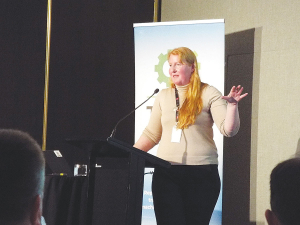A 2022 Nuffield scholar, Lucie Douma, was brought up on a Southland dairy farm and as a hobby likes the risky business of trail running and ultra marathons.
It should be no surprise then that she works in the "risk" industry as head of client strategy and advice at insurer FMG.
At the recent Tractor and Machinery Association (TAMA) conference held in Wellington, Douma delivered an interesting presentation titled 'Global Trends Impact on the New Zealand Agricultural Sector'.
Noting that much of our export might is driven into China, Douma suggested it was probably wise to cast the net a little wider, with other parts of Asia in the ascendancy and worth a closer look. This might be sage advice given that recent reports suggest that large-scale dairy farms in China, with over 1000 cows, make up 25% of producers and is predicted to rise to 40% by the 2023-26 season.
Looking further afield, she suggested that Europe, not unlike New Zealand, is currently focusing on the two main challenges of a changing political landscape and the lack of availability of a reliable labour force.
With regards to the former, after many years of a largely left leaning or Green political landscape, there are currently moves to the centre or far right administrations, a move that should be beneficial to farmers. Indeed, in Germany, recent regional elections in the eastern stage of Thuringia and Saxony, The Alternative for Germany (AfD) Party won over 30% of the vote, while the Green Party won less than 5%. This is likely to give the European Union some sleepless nights, as it is the first time a far-right party has won an election since World War 2.
On the European labour front, recruitment to agriculture is becoming an increasingly difficult problem, as is the general commitment of those that do venture into the industry.
This has seen the industry continuing to adopt a greater focus on agri-tech and automation. On the ground this means more robotic milking sheds, autonomous vehicles and even a move away from traditional farm shops to automated vending machines for farm products. Douma suggested these are probably areas that NZ Ag should look at.
Currently one of the greatest impacts in dealing with Europe is ongoing issues with the Suez Canal route. With shipping companies choosing to take the “safer” route around South Africa and the North Atlantic, journeys are being extended by around 20 days, increasing costs and eating into product shelf life. Up until recently, the situation has not been helped by reduced shipping levels through the Panama Canal because of low water levels, although in the last few months this has improved.
In North America, a different problem is emerging, primarily affecting corn and soya bean growers in the Mid-West. While climate change is continually on the radar, GPS guidance systems are currently under discussion. With farmers in much of the US relying heavily on GPS for planting, fertiliser and pesticide applications, their government is suggesting there is a national security risk if current systems encounter disruption from aggressive parties.


















